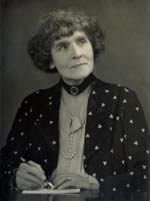Alice Verne-Bredt
Alice Verne-Bredt | |
|---|---|
 Alice Verne-Bredt around 1920. | |
| Born | Alice Barbara Würm 1864 |
| Died | 1958 |
| Nationality | English |
| Occupation | Pianist |
| Known for | Innovator of percussion bands for children in Great Britain. |
| Spouse | William Bredt |
| Relatives | Adela Verne (sister) Mathilde Verne (sister) Mary Wurm (sister) John Vallier (nephew) |
Alice Barbara Verne-Bredt (née Würm; 1864–1958) was an English piano teacher, violinist and composer.[1] Three of her sisters were also noted pianists: Adela Verne, Mathilde Verne and Mary Würm (who returned to Germany and retained the original family name).
Life and career
The sixth of ten children,[1] she was born as Alice Barbara Würm in Southampton to Bavarian professional musicians who emigrated to England in the 1850s.[2] Her father, a music teacher who specialised in zither, violin, and piano, worked as an organist.[3] Her mother was a violinist who taught her the violin from a very early age.[4] Later in her childhood she moved to London, where she lived all her life,[4] and there was taught piano by Robert and Clara Schuman's daughter, Marie.[5]
Alice wanted to become a singer, but typhoid fever affected her voice.[1] In 1893, her family anglicized their surname from Würm to Verne,[2] and Alice married William Bredt, an amateur musician and conductor. Both greatly contributed to the success of the piano school set up in London by her sister Mathilde in 1909.[1] During the same period she also established The Twelve O'Clock Concerts, a successful concert series for chamber music at the Aeolian Hall in London, where some of her own chamber music was performed.[3]
Alice took over the school's junior department, where Lady Elizabeth Bowes-Lyon, later Queen Elizabeth the Queen Mother, had a wedding march written especially for her.[2] There she became a pioneer of children's music education and an innovator in the use of percussion bands for that purpose. She died in London in 1958.[2]
Selected works
Few of her works were published. Perhaps the best known is the Phantasie Trio of 1908 for piano, violin and cello, which won a supplementary prize in the annual Cobbett chamber music competition, inaugurated two years before.[6] It was recorded in 2005 by the Summerhayes Piano Trio.[7]
Chamber music
- Cello Sonata
- Phantasie Piano Trio (1908) – performed at the Aeolian and Bechstein Halls on 25 January 1912.[8]
- Phantasie Piano Quartet (1908) (unpublished)
- Phantasie Piano Quintet (no date, unpublished)
- Piano Trio, No. 2
- Piano Trio, No. 3
- Wiegenlied (lullaby) for violin and piano (1911)[9]
Piano music
- Arrangement of Pavane: from King Henry VIII's Pavyn (1924)[10]
- Four easy inventions for young pianists (1920)[11]
- Musical box
- The little drum
- Concert study
- The doll's promenade
- Polacca (Polka) for piano and orchestra (also for string accompaniment)[12]
- Valse (1913)[13]
- Valse Miniature for two pianos (1913)[14]
See also
References
- ^ a b c d "Alice Verne-Bredt". Keyboardgiants.com. Keyboard Giants. Retrieved 16 December 2014.
- ^ a b c d "Alice Verne-Brendt". Meridian-records.co.uk. Meridian Records. Retrieved 16 December 2014.
- ^ a b Fuller, Sophie. "Women Composers during the British Musical Renaissance, 1880-1918" (PDF). Kclpure.kcl.ac.uk. King's College University of London. Retrieved 16 December 2014.
- ^ a b Seldon, Laura. "The instrumental music of British Women Composers in the Early Twentieth Century" (PDF). Core.kmi.open.ac.uk. City University London. Retrieved 16 December 2014.
- ^ Verne, Mathilde. Chords of Remembrance (1936), p 102
- ^ Musical Times 49, June 1908, p 397
- ^ English Romantic Trios. Meridien CDE 84478 (2005)
- ^ Seddon, Laura (2013). British Women Composers and Instrumental Chamber Music in the Early Twentieth Century. Ashgate Publishing, Ltd. p. nn. ISBN 978-1472402158.
- ^ "Alice Verne-Bredt (composer)". Discography of American Historical Recordings. DAHR. Retrieved 16 December 2014.
- ^ Catalog of Copyright Entries, Part 3, Issues 5-6. Library of Congress. Copyright Office. 1925. p. 528. OCLC 6481719.
- ^ 4 Easy Inventions for young pianists. OCLC. OCLC 495820443. Retrieved 16 December 2014 – via Worldcat.
- ^ "East End Wonder-Child". Paperspast.natlib.govt.nz. National Library of New Zealand. Retrieved 16 December 2014.
- ^ Valse. OCLC. OCLC 154646237. Retrieved 16 December 2014 – via Worldcat.
- ^ Valse miniature, for two pianos. OCLC. OCLC 498596654. Retrieved 16 December 2014 – via Worldcat.
